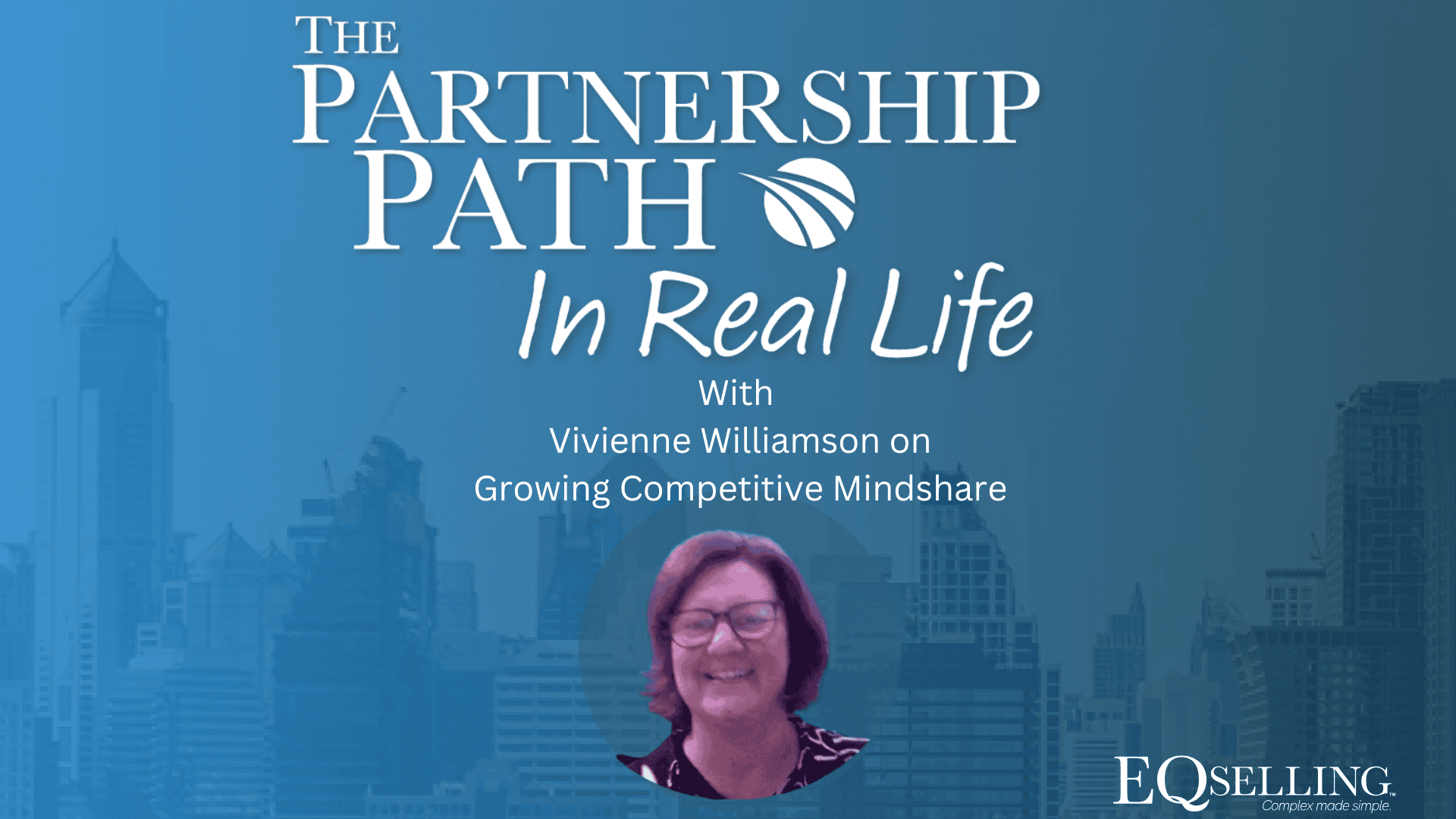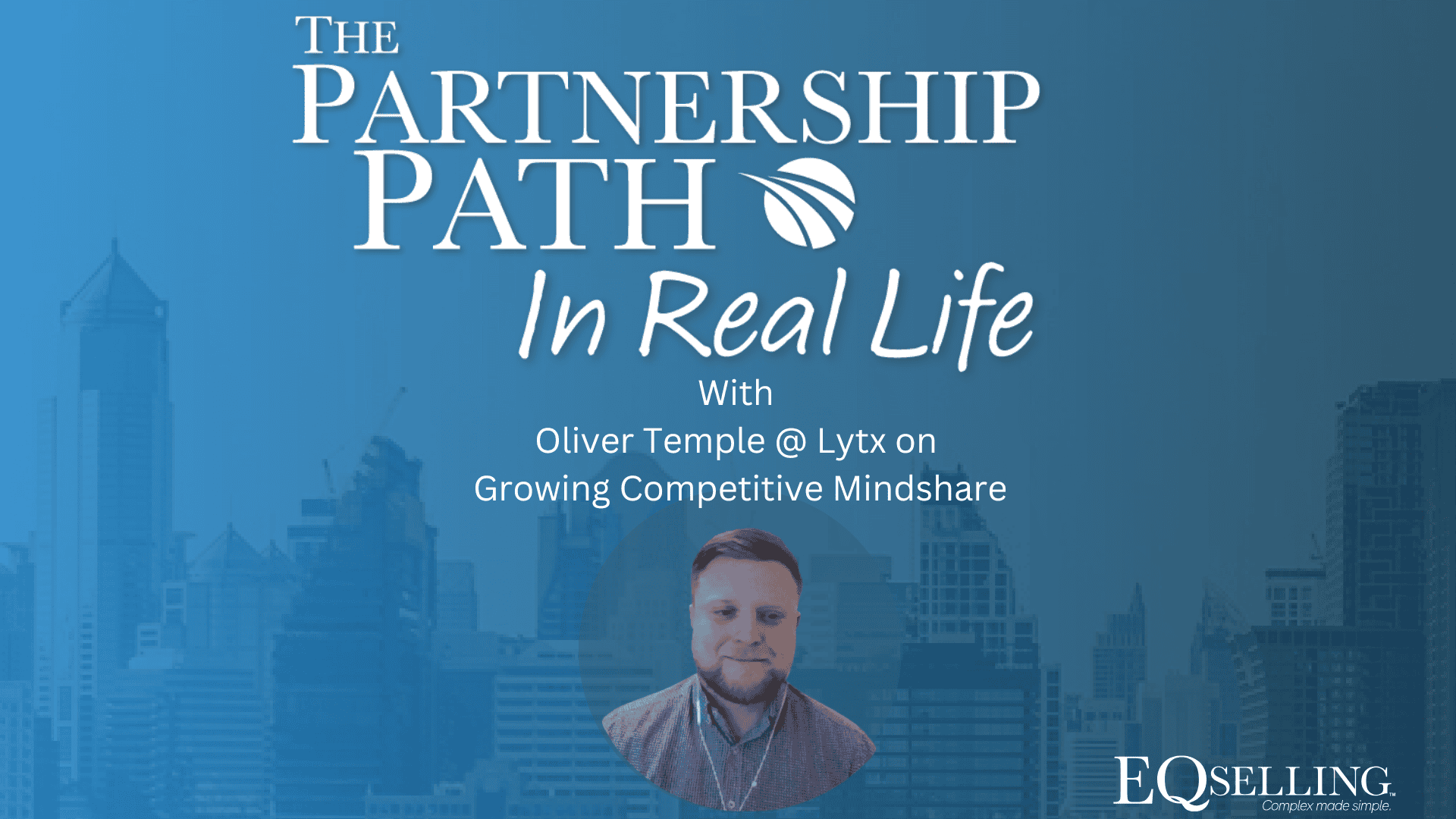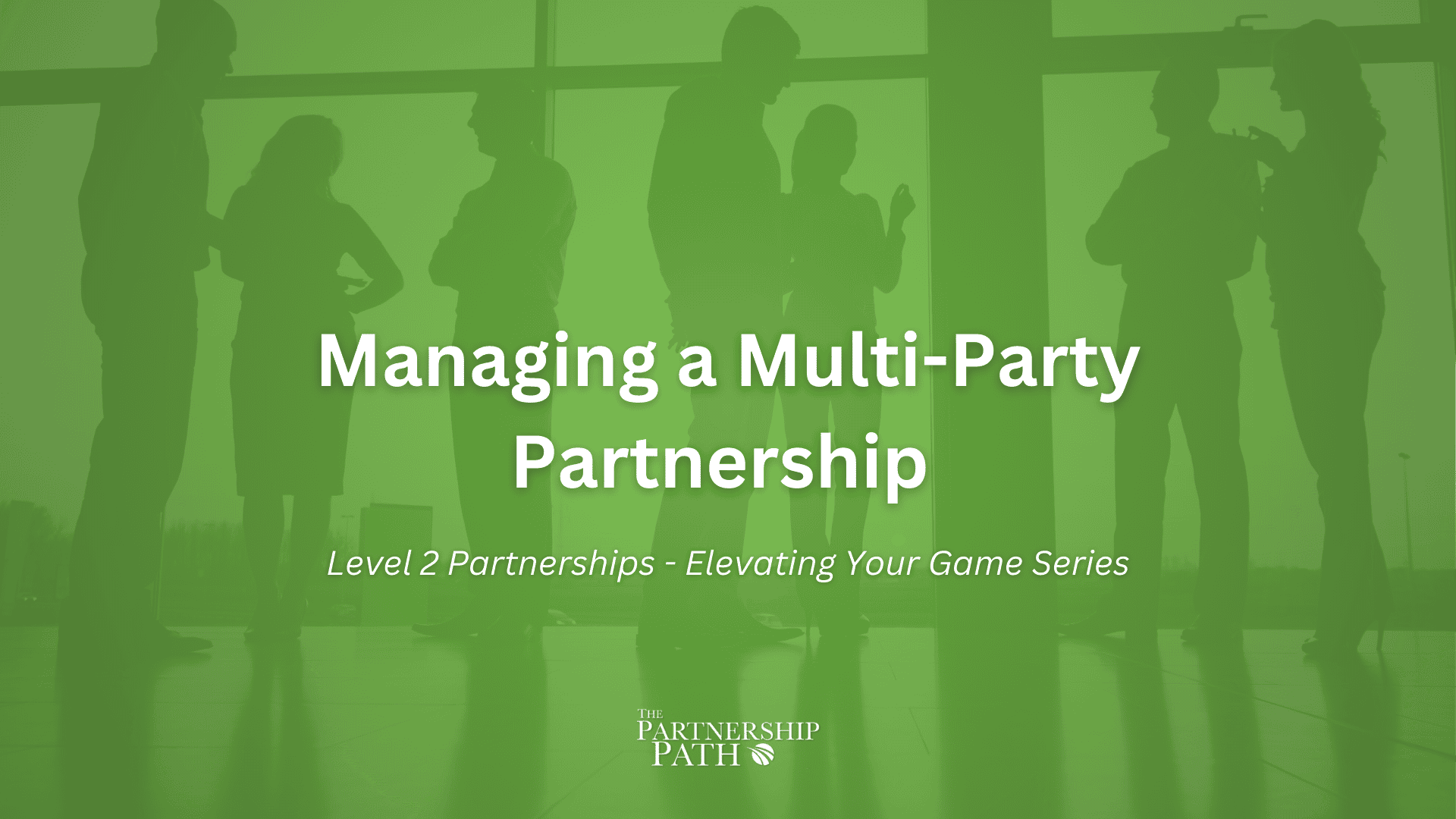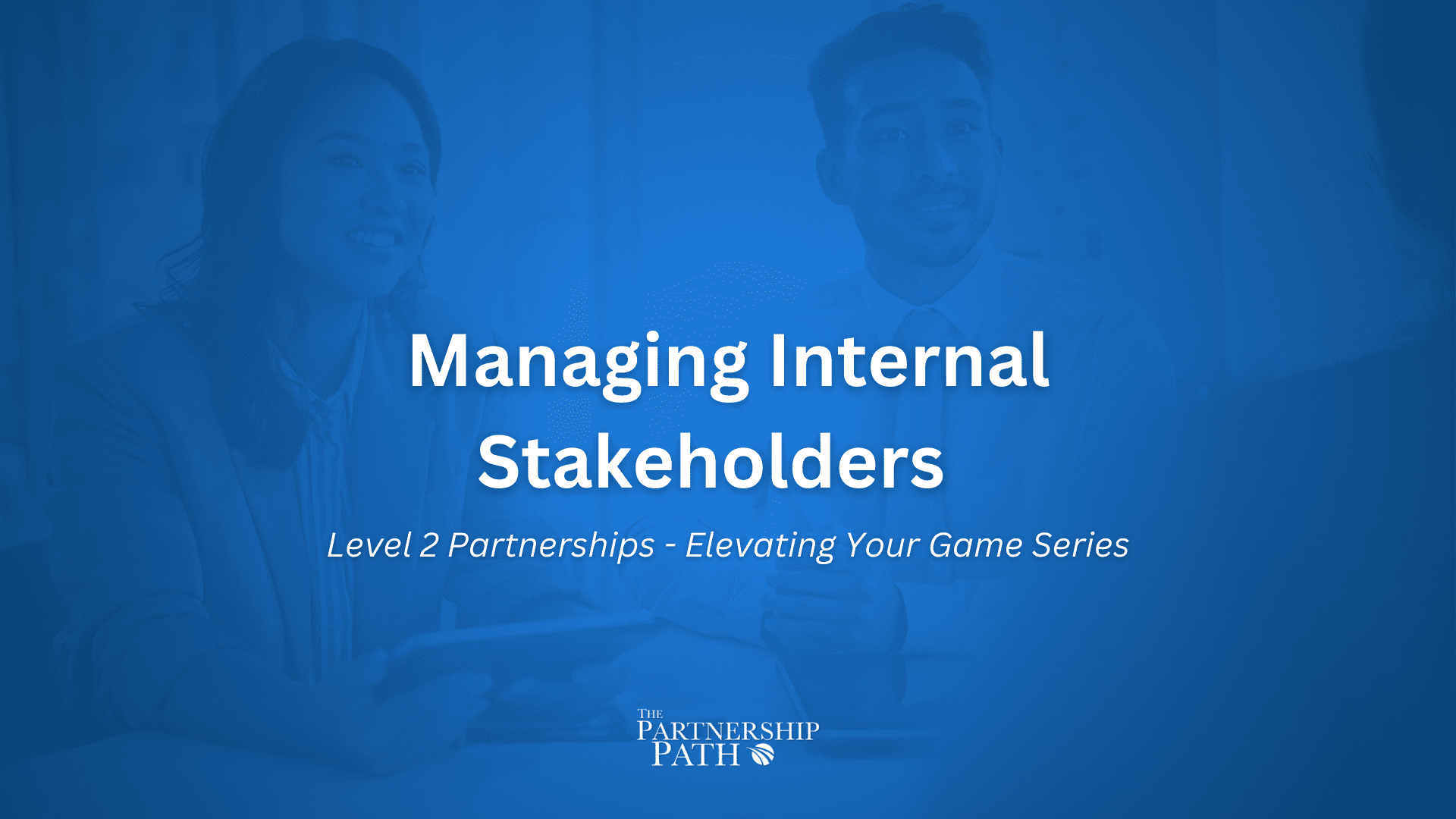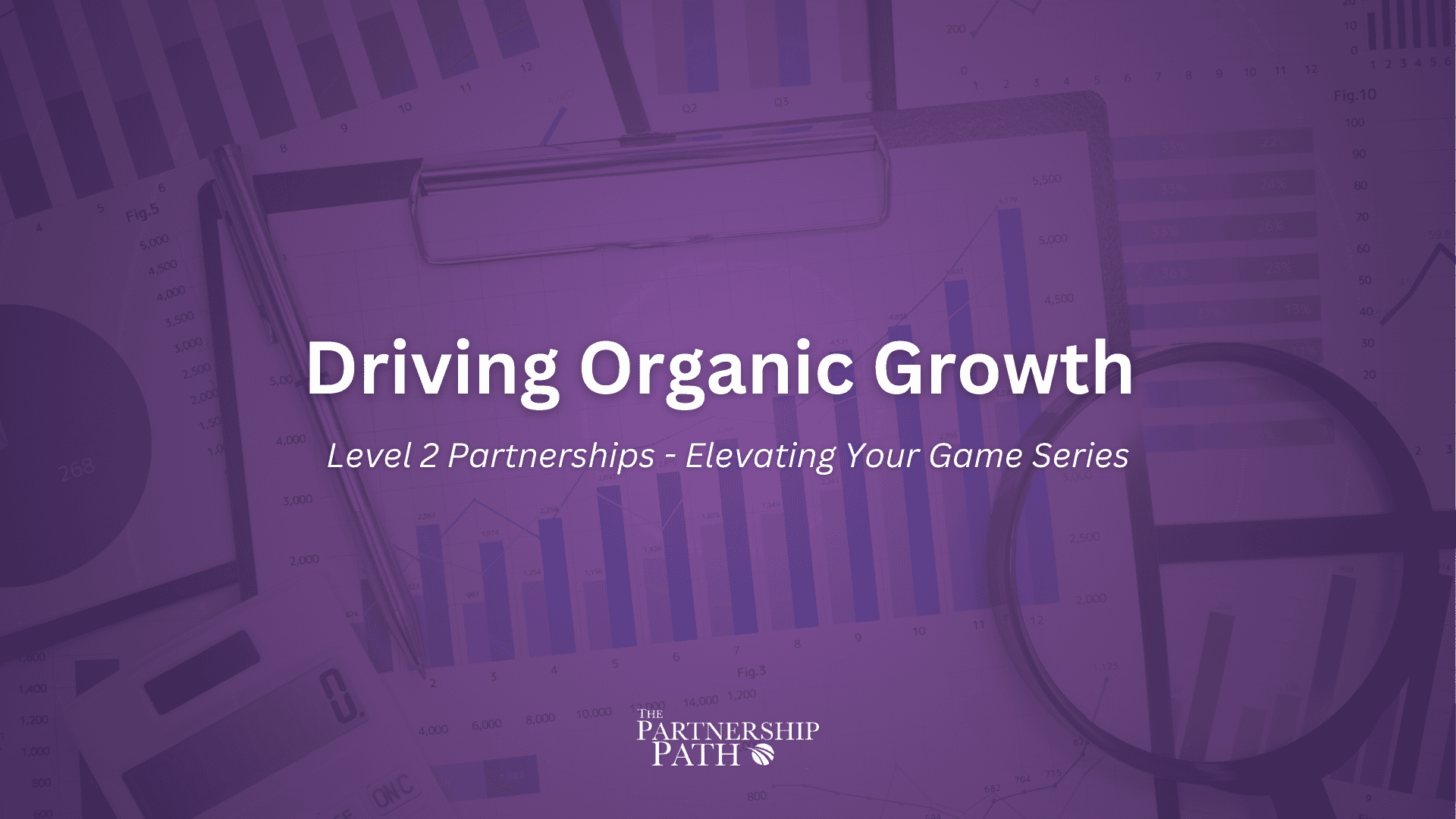Main Episode
Growing Competitive Mindshare
Episode Summary
In the latest episode of “The Partnership Path”, John Rudow and Toni Kent take a unique approach to understanding competitive mindshare in partnerships by likening it to gardening.
Just as weeds compete for space and resources, so do various partnerships within the complex network of business relationships.
This episode provides actionable insights into maintaining and nurturing these partnerships, making it essential listening for professionals navigating the often thorny landscape of collaboration.
Transcript
John (00:01.529)
Well, good morning. mean, I guess for you, good afternoon, Toni. Good evening. It’s already I know because of the time change, it’s later for you.
Toni (00:06.792)
any, I mean, we just exist in our own little kind of time zone, I like to think.
John (00:12.987)
Yeah, you guys do. That’s true. Well, welcome to another episode of the Partnership Path. Regardless of the time zone, it’s Partnership Path time. you know, we’re here to talk about it. Yeah. In our last episode, in the last episode you and I did together, you mentioned this concept of when you’re preparing for negotiations about, you know, thinking about what might the competitive
Toni (00:24.138)
It’s always partnership half time.
Toni (00:42.338)
Yeah. Yeah.
John (00:42.597)
partnerships be bringing to the table and how does that impact our negotiations? And so we want to dedicate a little bit of time to that topic. Was there anything, I know I kind of in that last episode, I think I kind of like was like, hey, let’s let’s talk about that in the next episode. Were there any anything that you were particularly thinking of back then or anything you wanted to dive into right away or?
Toni (00:51.309)
Yeah.
Toni (01:06.594)
Well, guess it was specifically with that, I was thinking about, you know, who are the other vendors that your partner might be working with? Cause that’s a, that’s an obvious one, isn’t it? It would be like, we get more margin here. We get better support there. We get to use the demo suite at this one. So that’s a kind of, that’s very tangible. but we know that’s not the only form of competition that you might have. Yeah.
John (01:17.497)
Yeah, for sure.
John (01:34.469)
For sure, for sure. Yeah, and look for me, look, I grew up in the Midwest of the United States. like, literally I grew up in a farming community. And so, you know, I like, I bailed hay as a kid and, you know, like some of that kind of stuff. And so gardening was a big deal when I was a kid. And this is how I think about competitive mind share. If you’ve ever garden before, you know how invasive weeds can be.
Toni (01:42.21)
Mm-hmm.
Toni (01:45.708)
Yeah.
Toni (01:53.144)
Yeah.
Toni (01:56.622)
Yeah.
Toni (02:02.286)
weeds can be, yes, yes.
John (02:04.311)
as well as those pesky rabbits and other animals can get in. And they’re all competing for the same thing, right? I mean, the weeds are competing for that same fertile soil and water and fertilizer or whatever else you put in there. And the rabbits, of course, are trying to just come in and take the proceeds, know, the quote unquote fruit of your labor. But I think
Toni (02:10.445)
Yes.
Yeah. Yeah.
Toni (02:20.023)
Yeah.
Toni (02:23.576)
Yeah.
Toni (02:27.495)
everything.
Toni (02:31.618)
Yeah.
John (02:33.659)
Really good partner people think about competitive mind share like a garden, which is you have got to.
Toni (02:45.25)
What happened, John? What happened?
John (02:45.573)
Sorry. Well, what happened is apparently my phone rang right into my computer, right in the middle of this recording session. So it was so good. I’m glad to hear that. I just look like I was like deer in the headlights for a moment, I think.
Toni (02:54.978)
I didn’t hear it.
Toni (03:00.942)
Do you want to just pick up and carry on rather than start again? that work? Is it?
John (03:08.281)
Yeah, let’s just keep moving. We’ll see what happens on the back end.
Toni (03:13.88)
So, because you could start with, I grew up in a farming community, you could start with that, yeah?
John (03:19.235)
Okay. Yeah, actually that should work. And then maybe Josh can cut out what’s in the middle. Yeah. Okay. So I grew up in the Midwest of the United States. I grew up in actually a farming community. you know, like I grew up, like I bailed hay as a kid. you know, we gardened, we grew our own vegetables and had fruit trees and all that kind of stuff. And so I, if you’ve ever gardened before, you know what that’s like, that there are weeds that
Toni (03:41.228)
Yeah.
John (03:49.039)
that come in that have to constantly be pulled out or taken care of. And there’s animals that try and get in, rabbits that come in to eat your lettuce and dig up your carrots and all that kind of stuff. And so I think really good partner professionals think about this competitive mind share topic like a garden, which is your partnership is constantly under attack. There’s a limited amount of resources at your partner.
Toni (03:51.694)
Mm-hmm.
Toni (03:58.51)
Hmm.
John (04:18.831)
that they can invest in whatever, partnerships and other things. And there’s lots of things trying to get at those resources. And like a garden, you cannot afford to sort of walk away for a little bit and not pay attention because those weeds will grow, they’ll take root, they’ll overtake the stuff that you’re growing or the rabbits will come in and eat all your radishes or whatever you’re growing.
Toni (04:28.756)
Yeah.
John (04:49.127)
And so you really have to pay attention to this and constantly be monitoring. I mean, the best partner professionals are the ones who are a little bit paranoid about whether their partnership is safe, right? Whether it’s under, you know, is it being attacked?
Toni (04:53.39)
Hmm.
Toni (05:00.236)
Yeah.
Toni (05:06.51)
I mean, I’ve got this visual now. I don’t know if you’ve ever seen what happens if cows get into a garden. So one of my friends…
John (05:12.731)
No. How in the world would a cow get into your garden?
Toni (05:17.762)
What’s at our house backs onto a field, which used to contain cows, but a friend of ours, her grandmother left the gate open and once they get in, the rest will come in and then they panic and then they find it hard to get. And so your garden is trashed. So the lesson there is like you said, be aware, shut the gate, protect your boundaries, nurture what’s there.
John (05:22.725)
Alright.
John (05:28.005)
Yeah.
John (05:31.737)
No.
John (05:35.802)
Yeah.
John (05:40.901)
Keep the gate closed. Yeah.
Toni (05:46.638)
But I think it is a nice kind of analogy and sometimes you might not see some of the things that might creep in and take a bit of that share.
John (05:56.229)
Yeah. Yeah. Yeah. Well, and to your point, I think, I think I love the cow example only because it’s something I hadn’t even thought of. And it’s exemplary of how we can get surprised by who the competitors are. Right. That it’s not just our competitors who are trying to get in there. It’s
Toni (06:15.5)
Yes.
John (06:24.683)
any competition for those resources. So it could be another internal project that they want to fund. It could be a develop, like a development project that could say, you know what, we’re going to spend the money instead of spending money on this partnership, we’re going to spend it on actually building our own solution. It could be, you know, it could be as, as mundane as headcount. We’re not going to spend money on this partnership. We’re going to hire direct salespeople over here or buy new laptops for people or
Toni (06:35.138)
Yeah.
Toni (06:50.659)
Yep.
John (06:53.327)
mean, there’s all kinds of things that could come in. And I think the one that people often don’t want to admit is a competitor is our own company in a different line of business or a different division. When we think about like people who have reseller partners and
Toni (06:53.528)
Hmm.
Toni (07:10.636)
Mm-hmm. Yeah.
Toni (07:17.687)
Yeah.
John (07:19.531)
they have a reseller relationship with them, but then their own services department is also going after that same partner to try and get them to be an implementation partner. And that’s going after the exact same resources that you’re going after. And so that’s a competitor. That’s a weed that’s potentially growing in your partnership that you got to figure out, are we going to let it grow? which, you know, how are we going to do that?
Toni (07:24.748)
Yeah.
Toni (07:31.053)
Yeah.
Toni (07:47.456)
Yeah. And, and I think, there is that being, it is that awareness. And if you’re dealing with a, well, actually any size account, but you’d see a lot in large accounts where, and I think Vicky talks about having a, teaming agreement. Yeah. It was Vicky at Splunk. So, and it’s something I experienced at Microsoft where we had people that were doing, OEM, services.
John (08:04.144)
Yeah.
Toni (08:13.966)
You had the enterprise team wanting to deal with the biggest accounts. And unless you’re on top of that, makes you, first it look a bit foolish. It can look as a kind of perception of your organization. It’s like, they don’t even know how to speak to each other. and it can make you less effective as well, because whilst you might all be carrying different targets.
John (08:14.329)
Yeah. Yep.
Toni (08:38.815)
There is a lot to be said for kind of coming together and going right. If we look left to right across this partnership, how do we make it better in the round? Because it makes it stronger, doesn’t it?
John (08:45.851)
Yeah. Yeah.
For sure. look, think the thing you can’t ever lose sight of too is this is not a apples to apples comparison. The partner’s not comparing you to the other partnership in the same way because they partner at all for a reason, right? Like they choose to partner.
Toni (09:01.486)
Hmm.
Toni (09:13.88)
Yeah.
John (09:16.961)
in order to get something like to get to a market that they can’t get to to to offer their existing customers a solution that they don’t already have to grow their business in some particular way. And when we lose sight of that, the partners motivation, it means that we end up pitching our partnership like kind of the value prop that we put together for our partnership wrong.
Toni (09:31.95)
Mm.
Toni (09:37.325)
Yeah.
Toni (09:44.844)
Yeah.
John (09:45.283)
And so we spend a ton of time talking about, you should be on Microsoft’s platform, not on Amazon’s platform, because our platform is better. That’s the wrong argument in many cases. The argument is, hey, our platform helps you get to where you’re trying to go better than their platform does or whatever. It takes some mental exercise to actually think about what’s the partner actually trying to do.
Toni (09:53.612)
Hmm.
Yeah.
Toni (10:02.988)
Yeah. Yeah.
John (10:13.337)
Who else is trying to pitch them for those scarce resources? And how do I build a competitive value prep for that?
Toni (10:21.624)
Yeah, yeah, it’s really important and knowing the different, and we talked about the priorities that that partner might have, what they value, what is valuable to them. And I, and you see it where, I won’t say who the vendor is, but they have an offering that a lot of people wouldn’t think that they have. And it, it delivers to partners, something like 10X the margin that the well-known market leader does.
And, so the market leader hasn’t seen this coming. And I think it is, you know, they’re kind of bedded in and everybody knows them for that solution. But over here, there’s somebody else going, you can make 10 X margin. And that’s pretty compelling.
John (10:55.984)
Right.
John (11:11.845)
Well, yeah, if that’s what is important to the partner, right? If that margin is somehow relevant to that, to their business model, or does making 10X margin on this competitor, but they have access to a much smaller customer base, does that negate that 10X? Right? Like, I mean, that’s, that’s the challenge is, you know, you can argue it.
Toni (11:16.336)
Yes. Yes.
Toni (11:23.276)
Yeah.
Toni (11:37.431)
Yeah. Yeah.
John (11:40.891)
both ways. If I was a partner account manager in both of those companies, I think I could come up with a pretty good value proposition for it right for both of them, right? Because it’s it’s all in the eye of the beholder. We just have to make sure who’s got the better sense of the eye of the beholder.
Toni (11:48.44)
Yeah.
It’s the if.
Toni (11:55.436)
Yeah, yeah, it is that if I thought about something before you wrap up, I did think about something that Jen at Microsoft said, which plays, I think nicely into that whole competitive piece. And it was, what are the what is the partner saying about you and your organization when you’re not in the room? And I thought, yeah, that was really cool.
John (12:02.064)
Yeah.
John (12:14.063)
Yeah. Yeah.
John (12:19.045)
Was that, was Jen Martin who said that? I love that. That’s so, talk about a way to send your anxiety through the roof, If you’re really honest with yourself, right? When you’re in there you have a great partner meeting in your mind and then you leave, what do they really say? Are they like, hey, was really a great meeting. Are they like, I thought he would never shut up or, right?
Toni (12:20.812)
It was, yeah.
Toni (12:28.886)
Hahaha
Toni (12:48.654)
you
John (12:49.039)
Like, how are they thinking about you in terms of what you’ve brought to the table? Yeah.
Toni (12:51.726)
Well, I think a basket of fresh produce from you, John. That’s what I’m thinking now. Now I know that you can grow vegetables. Yeah, and no weeds.
John (12:59.161)
Yeah, no weeds, no weeds at all. Who would have thought that I was a gardener, I’m sure my persona just exudes good gardener, but I was actually, was really not a very good gardener as a child for sure. It way too much work. was just backbending work.
Toni (13:17.185)
You’re keeping the weeds out of other places now, keeping the weeds out of partnerships. Yeah.
John (13:20.761)
Yeah, that’s right. Look, the last thing I want to say about this before we talk about getting some in real life people in here is we this I think it’s really important to remember that competitive mindshare is a strategic alignment element. It’s a big picture element because what competitive mindshare determines is the boundaries of the partnership. What where is our target focus over the long term?
Toni (13:38.83)
Mm.
John (13:51.245)
It’s not a short-term play. Competitive mind-share, both protecting it and trying to grow it, that’s a long-term play. And so we have to be thinking more strategically about it. It’s not a tactical type of thing. anyway, can’t wait to hear some horror stories perhaps from some in real life people about where they’ve gotten surprised by a cow coming into their garden.
Toni (13:54.446)
Yeah.
Toni (13:59.073)
Yeah.
Toni (14:06.092)
Yeah, agree.
Toni (14:17.718)
You
John (14:19.168)
or some really nasty little weeds that every time we pluck them, they continue to grow back again. I can’t wait to hear how people have dealt with this, because this is stuff that’s happening every day out there. So I’m really anxious to hear how our community responds.
Toni (14:34.509)
Me too.
John (14:36.923)
Well thanks Toni. Have a good evening.
Toni (14:38.456)
Thanks, John.
Key Takeaways
- Understanding Competitive Mindshare: Partnerships must be continuously nurtured and protected from various competitive pressures, much like a garden requires regular maintenance.
- Proactive Monitoring: Staying vigilant about external and internal competitors is crucial for sustaining a successful partnership.
- Strategic Alignment: Long-term success depends on aligning partnership objectives with both partners’ visions and resources.

